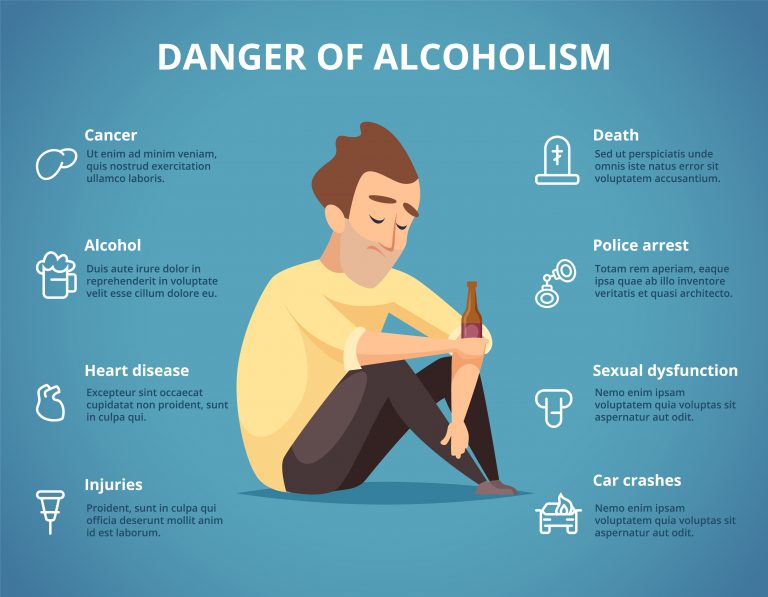Whenever we hear someone is an alcoholic, all we think of is an individual whose life revolves around alcohol. His family, children, friends, and even workplace dynamics are distorted, while all he cares about is drinking alcohol. But this might not always be the case.
Sometimes, a person struggling with alcoholism may still show up for their family, give 100% at work, and be even more social than others. Such individuals are known as functioning alcoholics. Keep on reading to learn more about who they are and what distinguishes them from other types of alcoholics.
Fact: According to a report by the National Institute on Alcohol Abuse and Alcoholism, over 20% of alcoholics in the U.S. are highly functional.
Who is a Functioning Alcoholic

This is someone who has alcohol dependency but still manages to maintain a stable life. You will see such people going to work and outperforming their roles. They will have a lively social life and may often be extremely outgoing. Their family is their priority, and they manage to make time for them no matter what. Such individuals are known as functioning alcoholics. The term ‘functional alcoholic’ is also used to describe people who appear to handle their responsibilities and social roles despite their alcohol problem.
However, beneath all these worldly tasks, they hold a secret: a strong reliance on alcohol. A high functioning alcoholic is able to manage daily tasks, such as work and family obligations, while hiding their alcohol use. Unlike stereotypical alcoholics, they appear at peace and are obedient with their everyday responsibilities.
The scariest part about this form of alcoholism is that it creates a false illusion of control. As a result, an individual suffering always believes there is nothing wrong. He or she continues to function while consuming alcohol to the point where they become dependent on alcohol and the dependency peaks.
How It Develops
Functioning alcoholism doesn’t start with a drink or two, nor does it develop overnight. It begins with taking a few shots after work to relieve stress or drinking to pull a more outgoing personality during a social gathering. Often, people seek temporary relief from stress or social anxiety through these habits. While initially these habits may seem harmless, over time they can evolve into patterns that lead to unhealthy alcohol use.
And when these patterns are reinforced again and again, they turn into a necessary coping mechanism. Soon, an individual is stuck in a cycle of addiction, but they still manage to look after everything because for them, life must go on.
Example
Let’s take the example of Sarah. She’s a lawyer in Manchester. She’s happily married to the love of her life and has 2 beautiful kids to look after. Being a wife and mother, she manages all her duties and outperforms her clients as well.
However, after each court day, she gets back home to drink until she falls asleep. She doesn’t acknowledge this as a problem, nor does the husband find it wrong. Why? Because they believe this is a good way to unwind after a tiring day.
Initially, she started with a glass or two, but now she has lost count as her body has developed tolerance. Now, she needs more alcohol to achieve the same effect as before. She is not missing work, neglecting kids, or bursting with anger, but the dependency is growing inside her.
Causes and Risks

It’s never just one factor that compels a person to become a functioning alcoholic. There can be many underlying issues, and understanding the risk factors is crucial, such as:
Upbringing: If someone grows up in a house where drinking used to be a coping mechanism, they might adopt the same habit later in life. These people may excel in every domain of their lives, but would still engage in alcohol related activities to suppress stress. This environment can also contribute to the development of heavy drinking behaviors over time.
High Stress Environments: Those having highly stressful surroundings, whether at home or work, are also at a higher risk of developing functioning alcoholism. They surrender to drinking as a way to escape daily life challenges and return to work at their full capacity. Over time, these risk factors can lead to alcohol use disorder, which may go unnoticed due to their ability to maintain daily responsibilities.
Personality Traits: People having personality traits such as perfectionism, impulsivity, or introversion are also prone to becoming functioning alcoholics. These individuals often tend to suppress emotions to make themselves appear strong. To relieve the pressure they inflict on themselves, they resort to alcohol, which can escalate into heavy drinking.
In summary, alcohol misuse is a common result of these combined factors, often leading to significant health and social consequences.
People Who Are More Prone to Functioning Alcoholism

Yes, there is a certain set of individuals who are more likely to develop functioning alcoholism compared to others. Some individuals in these groups may binge drink as part of their risky behaviors, which increases their risk of developing alcohol-related problems. It is important to be aware of how much alcohol is being consumed by these at-risk groups, as this can influence both the risk and the approach to treatment. These include:
1. Workaholics Under Stress
Some people are workaholics by nature. They are always juggling multiple tasks at a time. You will often find them chasing deadlines and tracking responsibilities. Such individuals are always in pursuit of achieving more. To detach from pressure, they often resort to alcohol for a temporary fix without disturbing their productivity.
2. Individuals With Undiagnosed Mental Health Disorders
High-functioning people with undiagnosed mental health disorders such as anxiety, depression, or PTSD may also turn to alcohol for quick relief. The problem with them is that they don’t know what is bothering them. Consequently, they continue drinking and going about their daily lives, not realising how toxic this coping strategy can become.
Consulting a mental health professional can help identify and address these underlying issues.
3. Caregivers Carrying Emotional Pain
Whether it’s providing care to children, a partner, or parents, it can get overwhelming at times. Caregivers, while looking after everyone, may forget to look after their physical as well as emotional well-being. This can put them under a lot of stress, due to which they may start drinking. The combined stress of caregiving and alcohol use can negatively impact a person’s personal life, affecting their relationships and emotional health. For such people, alcohol becomes a medication to get rid of stress.
4. Perfectionists Bearing Pressure
Those who strive for perfectionism in every task or hold themselves to impossibly high standards mask their inner vulnerabilities. To ease their tension, they may turn to alcohol, tricking their brain into believing everything is under control. However, this combination of perfectionism and alcohol use can often lead to relationship problems, as the stress and coping mechanisms strain personal connections.
Why Do Functioning Alcoholics Often Go Unnoticed?
Honestly, you will barely notice someone going through functioning alcoholism. Why? Because these individuals often cover their drinking problems with their capabilities. However, it’s important to recognize that functioning alcoholics may still experience negative consequences from their drinking, even if these issues are not obvious to others. Some major reasons that functioning alcoholics may remain unidentified, even among their closest acquaintances, include:
They Are Perfect at Everything!
Whether it’s managing their own lives or advising others, they are always perfect at doing it. You will always find them getting along with everyone and exceeding their expectations. Their ability to outperform always camouflages their drinking habits.
They Are Good at Hiding
These individuals know how to drink just the right amount of alcohol to get off the stress without losing control. To preserve their image, they carefully time their drinks, hide their alcoholic beverages to avoid detection, and even have a backup plan for hangovers.
Their Productivity Overshadows Sobriety
Remember how, when someone outperforms at work, their negative behaviours often go unnoticed? That’s exactly what happens with functioning alcoholics. Their positive aura overshadows their binge drinking, and often their alcoholism is labelled as a reward for working hard. Unfortunately, society also approves of such behaviour as long as the work gets done, frequently overlooking excessive drinking as a serious issue.
They Look After Themselves Well
Alcoholics are often stereotyped as individuals with a bit of a disorganised appearance. As they’re always under the influence, they aren’t able to look after themselves or maintain their image.
Functioning alcoholics, on the other hand, are extremely well-organised. They take care of their hygiene and ensure they have a reputable image in society. Their near-perfect appearance can often mask their alcoholism to even the closest family members.
9 Clear Signs of a Functioning Alcoholic

So, if functioning alcoholics can mask their drinking habits, how can they be recognised? And if you’re someone who drinks regularly, could it be possible that amid the chaotic life, you’ve unknowingly developed this condition? These signs may indicate a drinking problem, even if outward success is maintained.
It is important to monitor your alcohol intake to help recognise these signs early.
Here are 9 clear signs that may make it even easier for you to identify a functioning alcoholic, whether in yourself or someone you care about.
1. Drinking in Isolation
Many functioning alcoholics’ “me time” is binge drinking in private. They have this well-maintained image in society. To avoid distorting their reputation and getting away with judgmental questions, they hide their alcohol consumption.
2. Justifying Alcohol Use
“I have earned this drink.” “A drink or two just to unwind the day.” Or “Everyone drinks at the end of the day.” When a person repeatedly makes such excuses for their alcohol use, it normalises the behaviour and masks the growing dependency.
3. Involving Alcohol in Everyday Routine
For functioning alcoholics, the tendency to consume alcohol becomes integrated into their everyday activities. Drinking is a must-have part of their daily routine. Sipping while doing chores, having a glass when preparing dinner, or having a shot before bed. Alcohol will always find a way into their routines, even if they are super-occupied.
4. Believing Everything Is Under Control
One delusion that functioning alcoholics live by is that everything is in control. Because they are excelling in every domain, they don’t see any problem. This belief makes them avoid seeking help even when their dependency has peaked.
5. Prioritising Events Where Alcohol Is Served
Alcohol dictates the calendar of functioning alcoholics. These people attend meetings, parties, or dinners where alcohol is served. And if a gathering isn’t serving drinks, they avoid attending them altogether.
6. Making Themselves Appear High Functioning
Such alcoholics, often referred to as high functioning alcoholics, make themselves appear as esteemed personalities to cover up their dependency. For this reason, they dress well, speak fluently, and come off as productive most of the time. This curated image is intentional. It acts as a shield to divert suspicion and prevent others from seeing the extent of their reliance on alcohol.
7. Becoming Defensive When Questioned About Drinking
When someone comments on their drinking habits, they quickly change the subject or become aggressive all of a sudden. This defensiveness arises due to their fear of confronting reality. For them, avoiding the topic is the easiest solution to cover up their dependency.
8. Joking About Alcoholism
These people suddenly become humorous whenever it comes to discussing their relationship with alcohol. They would brush off their drinking habits by saying something like, “I function better with alcohol.” This sarcasm becomes a shield, helping them conceal their alcoholism.
9. Handling Tasks Under the Influence
Functioning alcoholics can manage work, attend meetings, handle school runs, or complete house chores even after drinking. They will do all this perfectly and take pride in their ability to pull up perfectly under the influence. This further reinforces their belief that alcohol isn’t disturbing their life, even when, in reality, it clearly is.
Self Assessment: Are You or Your Loved Ones at Risk?

These 7 questions will help you recognise whether you or someone around is going through functional addiction. Alcohol use disorder occurs when certain patterns of behavior and symptoms, such as those described below, are present. If the answer to most of the questions is yes, consider seeking professional support right away.
Do you drink in private or hide alcohol from others?
Is alcohol necessary to make you get through the day?
Has your tolerance to alcohol increased since before?
Have you decided to quit drinking but failed?
Do you become aggressive when asked about your drinking habits?
Are you able to maintain work, family, or social obligations while drinking regularly?
Have you ever convinced yourself that because you’re productive, your drinking isn’t a real problem?
If you are still unsure, please take our Self Assessment Quiz to determine if you are drinking too much.
Functioning Alcoholism Treatment
The treatment often begins with acknowledging the problem, which is a crucial step toward recovery from alcohol addiction. Early intervention is important in treating functioning alcoholism, as it can prevent more severe health complications. The primary goal of treatment is to stop drinking and address the underlying alcohol addiction. Support groups play a significant role in ongoing recovery by providing community and emotional support. Seeking professional help may involve:
Detox
It is a medically supervised procedure in which alcohol is eliminated from your body safely. Doctors closely monitor you through this phase for withdrawal symptoms and may administer medications accordingly. This phase prepares you physically and mentally to face the next stages of recovery, and can significantly improve your physical health as part of a holistic approach to overcoming addiction.
Rehab Options
Depending on your situation and your priorities, your medical professional will then suggest inpatient or outpatient rehab programs. If your situation needs constant supervision, you might be advised to go for inpatient programs that provide 24/7 care. Otherwise, if you have responsibilities to take care of, you may be recommended to attend outpatient rehab.
Individual Therapy and Counselling
Therapeutic interventions like CBT or Equine-Assisted Psychotherapy (EAP) can greatly help in fixing the underlying issues that may have elicited the dependency. This can also aid in identifying triggers and developing healthy coping mechanisms.
Peer Support Programs
To maintain long-term sobriety, your therapist may also suggest you join peer support programs, often referred to as self help groups. Most common groups you may come across include Alcoholics Anonymous or SMART Recovery. This will help you get along with people who are going through the same struggles as you, making you feel less alone.
How to Seek Help
Seeking support when going through functioning alcoholism may be overwhelming because everything seems fine. Here’s how you can break through the stigma and seek the assistance you require:
Open Up to Someone You Trust. Consider reaching out to your best friend, colleague or a trusted family member. These people are your well-wishers and will walk with you through your healing journey.
Don’t Wait to Hit Rock Bottom to Ask for Help. You don’t need to collapse to ask for professional guidance. Reach out for help as soon as you feel you have developed dependency.
Reframe Support as Strength, Not Weakness. Do not think of getting help as a sign of being imperfect.
Consult Health and Human Services Guidelines. Federal health and human services agencies provide public health recommendations and support resources for those seeking help with alcohol use disorder.
Role of PCP
If you’re looking for expert guidance for treating your functioning alcoholism, you can always trust PCP. Our experts offer all the resources to treat dependencies related to any substance. We as a team prioritise our clients by providing them with tailored treatment plans according to their unique needs. Contact us today to start your healing journey.
Final Words: You Don’t Need to Suffer to Ask for Help
Functioning alcoholics must not be overlooked, as ignoring the issue can lead to serious health problems over time. If you spot any of the symptoms mentioned here in you or someone around you, acknowledge it and seek support right away. With structured support, compassionate care, right interventions, and most importantly, patience, you’ll be healed in no time. Remember, unhealthy alcohol use poses significant dangers, so seeking help early is crucial.
Author
-
Dr Otulana is PCP’s longest-serving doctor. He is an experienced Physician with Specialist Interest in Substance Misuse Management and he has a wide range of experience in the assessment and management (including detoxification) of clients with various drug and substance addiction problems. Dr Otulana started practising as a doctor in 2000 and with over 10 years as an Addiction Physician. He is an Advanced Addiction Practitioner Member of Addiction Professionals and also holds the Certificate in Clinical Psychopharmacology (Part 1) of the British Association for Psychopharmacology. He is additionally a strong healthcare services professional with a Master of Business Administration (M.B.A.) degree from Cambridge University Judge Business School.
View all posts








